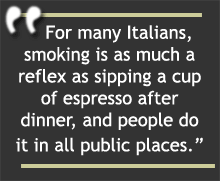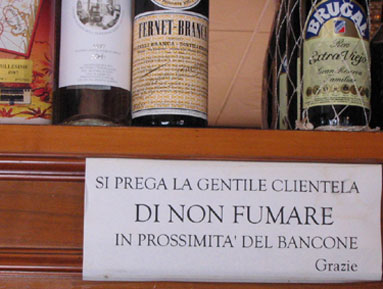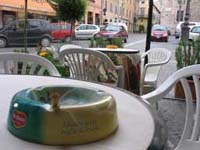

As I near the Al'Italia desk, an employee begins typing at a computer, calls to the next passenger in need of assistance, and casually lights a cigarette. Smoking while working, serving people nevertheless, in one of the world's largest airports! So far, I was confused by the casual attitude toward smoking displayed here in Rome's Fiumincino Airport. Little did I know that later that day, three hours away from Rome, I would encounter the same clouds and casual attitudes toward smoking in Cagli, a tiny town in the Marche region of Italy.
Having just arrived in Italy from New York City, the lack of restrictions on smoking was definitely a change. In the United States practically all public places, including train stations, airports, and shopping malls, have been smoke-free for years now. Most recently, New York City responded to pressure from nonsmokers regarding the dangers of second-hand smoke by passing a law banning smoking in all New York City bars. It struck me as strange that a major city such as Rome, reminiscent of New York City in so many ways, had not enacted similar legislation.
After only a few short hours, however, it became obvious that antismoking legislation will have little chance of succeeding in Italy anytime soon.

Alessandro, a regular at Caffe del Commercio, enjoys a cigarette to unwind at the end of the day.
Sip and Savor
Cagli Today
Cagli Project Main Page
Most Cagliese began smoking between the ages of 11 and 15. It is easy to pick up the habit at such a young age for two reasons. First, most Cagliese grow up in households where both parents smoke. Second, teenagers, and even some younger children, are often sent to the Tabacchi to purchase cigarettes for their parents. Eros, an employee at Antica Tabaccheria located in Piazza Matteoti, explains that although the legal age for buying cigarettes is approximately 15, he often sells to children of townspeople that he knows-- an accepted practice in many Italian towns.
Many Tabacchi -- shops established primarily for the purpose of selling cigarettes and other tobacco related products -- exist in Cagli. The endless rows of cigarette packs stand at attention behind the counter, puffed chests proudly displaying their labels. Many Italians, like Eros, earn their living operating a shop dependent on this cultural custom. Of course, smoking is allowed in these shops, even "mandatory," jokes Eros, a nonsmoker who acknowledges the role that smoking, and more specifically, smokers, play in the existence of his business and livelihood.

Cigarette boxes sold at Eros' tabaccheria in Piazza Matteotti now include health warnings like this one, which reads "Smoking blocks arteries and provokes heart attacks and strokes."
In recent years non-smoking regulations have begun to infiltrate the major cities of Italy, particularly Rome. Both Eros and Mimmi acknowledge the inevitable arrival of antismoking legislation in Cagli. Actual enforcement of the law, however, will be a different story. '' Cagli is destined to move in the same direction as New York City,'' explains Eros, Ňbut that doesn't mean that the Cagliese will simply adhere to the laws. Smoking is part of the roots of Cagli life.'' Caffe del Commercio has already begun to prepare its customers for the inevitable establishment of non-smoking policies by placing a relatively small, typed sign above the bar and on the back wall. The sign translates into English as:
Thank you.


Click here to here more about smoking in Cagli.

Caffe Commercio's non-smoking request has not been taken seriously by the clientele. Roll mouse over image to see how one person reacted.
Since no law has yet been passed yet and no fine set, Mimmi is not taking any active steps to ban smoking at her cafe. She is aware that if the Cagliese can't smoke at the cafe, they won't come to the cafe. Since Caffe del Commercio is the first bar to post such a sign, Mimmi would lose too much business if she actively enforced the policy.
Most customers at Caffe del Commercio simply laugh at the sign. Young men who frequent the cafe at night time have even offered some revisions. The sign now reads:
Thank you.

